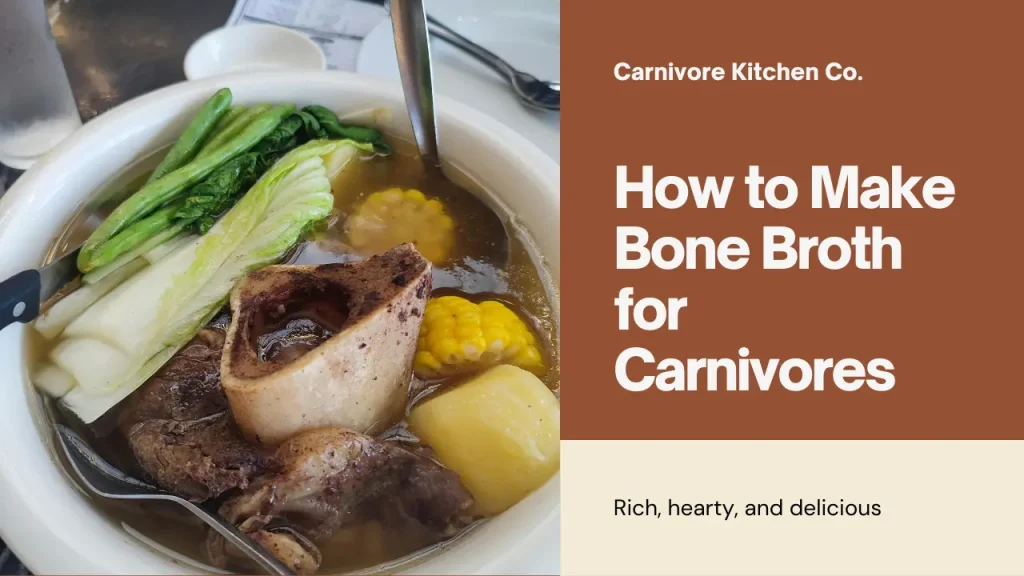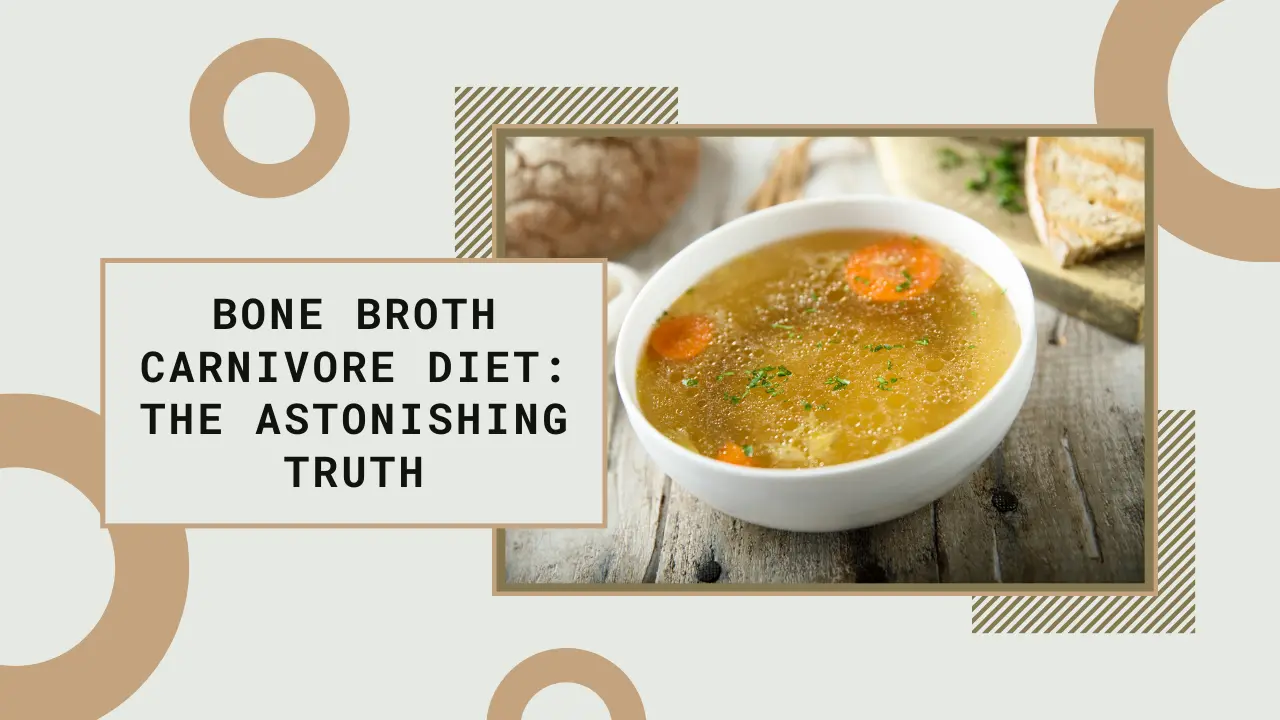There’s something deeply comforting about sipping on a warm, rich broth—it feels like a hug from the inside out. That’s exactly why the bone broth carnivore diet has gained so much love. Not only is it packed with nutrients, but it also helps with gut health, hydration, and overall well-being. If you’re following a carnivore diet, bone broth is like liquid gold—it keeps you energized, supports digestion, and provides essential electrolytes without breaking your diet. In this guide, I’ll walk you through why bone broth is a game-changer, how to make it at home, and the best ways to enjoy it. Ready to dive in? Let’s go!

What is Bone Broth and Why is it Essential for the Carnivore Diet?
Imagine a food so simple, yet so powerful, that it has been used for centuries to heal the gut, strengthen joints, and nourish the body. That’s bone broth—a slow-simmered, collagen-rich liquid made from animal bones and connective tissue. Unlike regular broth or stock, it’s packed with amino acids, electrolytes, and minerals that make it a nutritional powerhouse, especially for those on the bone broth carnivore diet.
If you’re eating only animal-based foods, you need all the nutrients you can get without relying on plant sources. That’s where carnivore diet bone broth benefits come in. It helps gut health, keeps you hydrated, and provides collagen for strong joints, skin, and hair. Plus, it’s soothing—whether you’re recovering from a tough workout or just want something warm and comforting.
Choosing the Best Bone Broth for the Carnivore Diet
Not all bone broth is created equal. The quality of your broth depends on the bones you use, the cooking process, and even the source of the animal.
- Grass-fed bone broth for the carnivore diet is the gold standard. Animals raised on pasture have higher-quality bones, which means more collagen, minerals, and healthy fats.
- Beef bone broth vs. chicken bone broth—which one is better? Beef bones are denser and contain more collagen and marrow, while chicken bones create a lighter broth rich in gelatin. Many people alternate between the two for variety.
- Store-bought vs. homemade bone broth—if convenience is key, you can buy pre-made options, but be sure to check the ingredients! Many brands sneak in preservatives, artificial flavors, or even hidden carbs. The best option? Make your own—it’s easier than you think!

How to Make Bone Broth for the Carnivore Diet
Homemade bone broth is one of the simplest yet most rewarding things you can make in your kitchen. It requires just a few ingredients, a bit of patience, and a good simmer. Here’s how:
Step-by-Step Guide
- Choose your bones – Use grass-fed beef bones or pasture-raised chicken bones for the highest quality. Marrow bones, knuckles, and feet (yes, feet!) add the most collagen.
- Roast the bones (optional) – This enhances the flavor, especially for beef bones.
- Add water and vinegar – Apple cider vinegar helps extract minerals and breaks down collagen.
- Simmer for hours – Slow cooker bone broth is the easiest method, but you can also use a stovetop or pressure cooker. Beef bones need 12-24 hours, while chicken bones take about 8-12 hours.
- Strain and season – Remove the bones, strain the liquid, and add salt for electrolytes.
Want to boost the benefits? Add a pinch of sea salt and magnesium to replenish minerals. This makes it an excellent electrolyte-rich drink, especially if you’re fasting or following a keto carnivore diet.
Bone Broth for Different Goals on the Carnivore Diet
Bone Broth for Fasting
If you’re doing bone broth fasting on a carnivore diet, you’re in for a treat. Unlike water fasting, bone broth keeps your body fueled with amino acids, collagen, and electrolytes, preventing fatigue and muscle loss. Plus, it helps curb hunger, making longer fasts much easier.
Bone Broth as a Meal Replacement
Can bone broth be a full meal? Not on its own, but it can be a great meal replacement when combined with fatty cuts of meat or added tallow. Many people sip on collagen-rich bone broth between meals to stay full and support gut health.

Nutritional Benefits of Bone Broth on a Carnivore Diet
Bone broth is more than just a warm, soothing drink—it’s a nutrient powerhouse that supports nearly every function in your body. If you’re following a bone broth carnivore diet, you’re giving your body a collagen-rich boost packed with essential amino acids, minerals, and electrolytes.
Bone Broth Nutrition Breakdown
Let’s break it down:
- Collagen & Gelatin – These proteins keep your joints strong, your skin youthful, and your gut lining healthy.
- Amino Acids (Glycine, Proline, Glutamine) – They help with digestion, muscle recovery, and inflammation.
- Minerals (Calcium, Magnesium, Phosphorus) – Support bone health, hydration, and nervous system function.
- Electrolytes in Bone Broth – If you’re on a keto carnivore diet, electrolytes are essential for preventing dehydration and fatigue.
Sipping on bone broth nutrition daily can help with gut health, skin elasticity, and even sleep quality. It’s like an ancient superfood that keeps you feeling strong and energized—and the best part? It fits perfectly into the carnivore diet without any carbs or unnecessary additives.
FAQs and Common Mistakes
How Much Bone Broth Should You Drink Daily?
There’s no hard rule, but 1-2 cups a day is a great starting point. If you’re fasting, you can drink more to keep your electrolytes balanced and stay full. Some people even replace coffee with a steaming mug of beef bone broth in the morning—trust me, it’s a game-changer!
Can You Drink Bone Broth on a Keto Carnivore Diet?
Absolutely! Bone broth and the keto carnivore diet go hand in hand. It contains zero carbs and helps prevent keto flu by replenishing lost sodium, potassium, and magnesium.
Mistakes to Avoid When Making Bone Broth
- Using low-quality bones – If you want the best bone broth for a carnivore diet, always choose grass-fed beef bones or pasture-raised chicken bones.
- Not simmering long enough – For max nutrition, slow cook for at least 12-24 hours for beef bones and 8-12 hours for chicken.
- Skipping the vinegar – A splash of apple cider vinegar helps extract the minerals and collagen from the bones.
- Not adding salt – Bone broth needs electrolytes, so don’t be afraid to season it well!
Conclusion
If there’s one thing to take away from this guide, it’s that bone broth is liquid gold for the carnivore diet. Whether you’re using it for gut healing, fasting, or just a comforting daily ritual, it’s one of the simplest and most nourishing things you can add to your routine.
The best part? Making homemade bone broth for the carnivore diet is ridiculously easy, and the benefits are worth every sip. So, grab some grass-fed bones, fire up the slow cooker, and enjoy the goodness. Your body will thank you!

